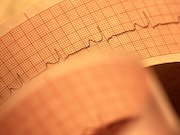Linked to lower risk of mortality compared to multivessel PCI in patients with acute MI and multivessel CAD
TUESDAY, Oct. 31, 2017 (HealthDay News) — Percutaneous coronary intervention (PCI) of the culprit lesion is associated with better 30-day outcomes than immediate multivessel PCI among patients with multivessel coronary artery disease and acute myocardial infarction with cardiogenic shock, according to a study published online Oct. 30 in the New England Journal of Medicine to coincide with the Cardiovascular Research Foundation Transcatheter Cardiovascular Therapeutics meeting, being held Oct. 29 to Nov. 2 in Denver.
Holder Thiele, M.D., from University Hospital in Leipzig, Germany, and colleagues randomly assigned 706 patients who had multivessel disease, acute myocardial infarction, and cardiogenic shock to either PCI of the culprit lesion only (with the option of staged revascularization of nonculprit lesions) or immediate multivessel PCI.
The researchers found that at 30 days, the composite primary end point of death or renal-replacement therapy had occurred in 45.9 percent of patients in the culprit-lesion-only PCI group versus 55.4 percent in the multivessel PCI group (relative risk, 0.83; 95 percent confidence interval, 0.71 to 0.96; P = 0.01). For death, the relative risk in the culprit-lesion-only group was 0.84 (95 percent confidence interval, 0.72 to 0.98; P = 0.03) versus the multivessel PCI group. Similarly, the risk of renal-replacement therapy was 0.71 (95 percent confidence interval, 0.49 to 1.03; P = 0.07). There were no significant differences between the groups with respect to time to hemodynamic stabilization, risk of catecholamine therapy, levels of troponin T and creatine kinase, or rates of bleeding and stroke.
“Among patients who had multivessel coronary artery disease and acute myocardial infarction with cardiogenic shock, the 30-day risk of a composite of death or severe renal failure leading to renal-replacement therapy was lower among those who initially underwent PCI of the culprit lesion only than among those who underwent immediate multivessel PCI,” conclude the authors.
Several authors disclosed ties to pharmaceutical and medical device companies.
Copyright © 2017 HealthDay. All rights reserved.








